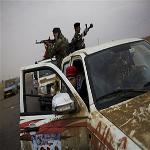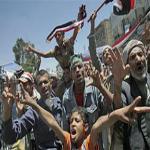April 20, 2011

Photo: AP
Libyan rebel fighters wait inside their cars before going to the front line, on the outskirts of Ajdabiya, April 20, 2011
NATO allies Britain, France and Italy are offering military advisers to help train Libyan rebels, as the military stalemate continues on the ground. Elsewhere, in Yemen and Syria, state crackdowns continue against anti-government protesters.
Rebel fighters continued to battle Libyan government forces Wednesday at the besieged port city of Misrata in western Libya. International efforts to evacuate residents also intensified, with several ferries transporting evacuees to Tobruk in eastern Libya.
Forces loyal to Libyan leader Moammar Gadhafi also lobbed shells and fired rockets at rebel positions defending the strategic eastern town of Ajdabiya. Neither side appeared to gain ground. Britain, France and Italy, meanwhile, prepared to send military advisers to help the rebels.
Diplomatic efforts to break the stalemate took place in Europe. Rebel council leader Mustapha Abdel Jalil met with French President Nicolas Sarkozy in Paris, after talks with Italian leaders in Rome a day earlier. He spoke of future alliances after fighting ended.
Jalil promised agreements and beneficial economic ties with countries that help the rebels now, but also offered to honor previous agreements with other countries.
In the Libyan capital Tripoli, Seif al Islam Gadhafi, one of the Libyan leader's sons, insisted that government forces are in a good position that is improving day by day. He said the world is with the Libyan government, and that he is optimistic for the future.

AP
Anti-government protestors react during a demonstration demanding the resignation of Yemeni President Ali Abdullah Saleh in Sana'a, April 20, 2011Elsewhere in the region, tens of thousands of anti-government demonstrators rallied Wednesday in Yemen's capital Sana'a, and in several other cities. The gatherings took place despite a government crackdown Tuesday in which dozens of protesters were wounded.
The Gulf Cooperation Council talked with representatives of Yemen's government and opposition in the United Arab Emirates. The talks centered on a GCC plan for Yemeni President Ali Abdullah Saleh to step down.
A representative of Saleh's ruling party, Ahmad Obeid Ben Dagher, said it is best that the president remain in office for the time being. He said the government side is ready to implement the plan, but the opposition must understand that a transfer of power must follow the constitution.
In Syria, several anti-government sit-ins took place overnight near the port city of Banias, in a suburb of the capital, Damascus, and in Deraa. Demonstrators denounced government accusations that Islamic extremists were behind the recent protests.
Syria's interior ministry has forbidden further protests, although the government is in the process of repealing a state of emergency law that dates back to 1963. A Syrian opposition support group on Facebook is calling for more anti-government protests Friday.